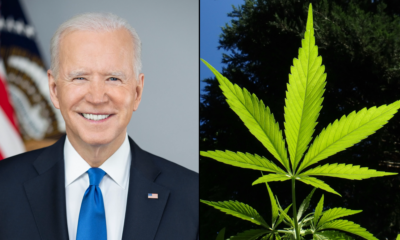Politics
Montana Governor’s Plan For Marijuana Tax To Fund Drug Treatment Departs From Voter-Approved Initiative

The governor of Montana said on Thursday that he wants marijuana tax revenue to fund drug treatment as the state grapples with the consequences of substance misuse. But that’s not how those dollars were designed to be appropriated when voters approved a legalization initiative in November.
In his first State of the State address, Gov. Greg Gianforte (R) spoke at length about how the misuse of meth has overstrained the state’s child services, treatment programs and criminal justice system. He laid partial blame on a lack of resources and said that tax dollars that come once Montana’s cannabis legalization measure is implemented should fill those gaps.
“Part of the foundation of the American Dream is safe communities where we live and work and where our kids go to school. But our state faces a grave threat to our safety: drug use, particularly meth,” he said. “There is no silver bullet, but there are steps we can take to confront it.”
“My budget begins to take some of those steps. It will make investments. Let me be clear: tax revenues from the sale of recreational marijuana should go to confronting the epidemic of addiction in Montana,” Gianforte said, drawing applause from members of the joint session who attended his speech.
Watch the governor discuss his marijuana tax proposal below:
The governor said cannabis revenue—as well as tobacco tax settlement money—should be put into the state’s Healing and Ending Addiction through Recovery and Treatment (HEART) Fund, which will “provide a full continuum of substance prevention and treatment programs for our communities.”
My budget devotes marijuana tax revenue and part of the tobacco tax settlement to the HEART Fund, which will fund a full continuum of substance abuse prevention and treatment programs for communities.
— Governor Greg Gianforte (@GovGianforte) January 29, 2021
“Under our current system, there are gaps in coverage that reduce effectiveness,” he said. “In some communities there are no coordinated prevention programs. In other communities, there are gaps in meth treatment. In some communities, there’s a lack of local recovery support for someone leaving treatment who wants to stay clean sober and healthy. We must close these glaring gaps, and the HEART fund will do that.”
While voters approved an adult-use legalization initiative in November, implementation has been off to a rocky start, with lawmakers voting earlier this month to reject a request from the state’s Department of Revenue for money to fund the launch of the program.
Adults are allowed to possess and cultivate marijuana for personal use since those provisions took effect on January 1, but creating the infrastructure for retail sales has proved challenging.
Economists have projected that Montana stands to bring in $52 million annually in cannabis tax dollars once the system is up and running. The ballot measure calls for half of that revenue to fund environmental conservation programs, with smaller portions going to veterans services, health care, local governments and the state’s general fund.
That’s not the governor’s vision, however. He outlined his plan to use marijuana revenue to fund substance prevention and treatment in a budget request he released at the beginning of the month. It stipulates that $23.5 million in cannabis taxes and the tobacco-related settlement should go to treatment each year.
At a press conference earlier this month, Gianforte said he plans to “recognize the voters’ wishes” in passing legalization, but then explained his decision to spend the resulting funds differently than under the provisions of the ballot measure.
“What we are requesting in this budget is that revenues from the legalization of marijuana be prioritized for two things. One is addiction recovery, and secondly, economic development. So that is different than what was in the initiative, but that right is reserved to the legislature. We’re asking them to prioritize those two things with any funds that are raised from the legalization of marijuana.”
Another barrier to implementation for adult-use legalization is playing out in the courts. Opponents have filed lawsuits contesting the voter-approved initiative for procedural reasons, arguing that its allocation of revenue violates the state Constitution.
A similar situation is taking place in neighboring South Dakota, where voters passed their own cannabis reform measures in November but where opponents are challenging legalization in the courts.
The person behind the Montana suit, auto dealership owner Steve Zabawa, also filed a campaign finance complaint against a major funder of the legalization effort, the advocacy group North Fund, which contributed more than $4.7 million to the campaign.
Pennsylvania Governor Includes Marijuana Legalization In 2021 Priority List
















